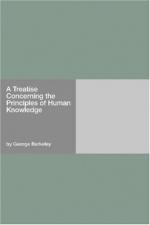13. Abstract general ideas necessary, according to Locke.—To give the reader a yet clearer view of the nature of abstract ideas, and the uses they are thought necessary to, I shall add one more passage out of the Essay on Human Understanding, (iv. vii. 9) which is as follows: “Abstract ideas are not so obvious or easy to children or the yet unexercised mind as particular ones. If they seem so to grown men it is only because by constant and familiar use they are made so. For, when we nicely reflect upon them, we shall find that general ideas are fictions and contrivances of the mind, that carry difficulty with them, and do not so easily offer themselves as we are apt to imagine. For example, does it not require some pains and skill to form the general idea of a triangle (which is yet none of the most abstract, comprehensive, and difficult); for it must be neither oblique nor rectangle, neither equilateral, equicrural, nor scalenon, but all and none of these at once? In effect, it is something imperfect that cannot exist, an idea wherein some parts of several different and inconsistent ideas are put together. It is true the mind in this imperfect state has need of such ideas, and makes all the haste to them it can, for the conveniency of communication and enlargement of knowledge, to both which it is naturally very much inclined. But yet one has reason to suspect such ideas are marks of our imperfection. At least this is enough to show that the most abstract and general ideas are not those that the mind is first and most easily acquainted with, nor such as its earliest knowledge is conversant about.”—If any man has the faculty of framing in his mind such an idea of a triangle as is here described, it is in vain to pretend to dispute him out of it, nor would I go about it. All I desire is that the reader would fully and certainly inform himself whether he has such an idea or no. And this, methinks, can be no hard task for anyone to perform. What more easy than for anyone to look a little into his own thoughts, and there try whether he has, or can attain to have, an idea that shall correspond with the description that is here given of the general idea of a triangle, which is neither oblique nor rectangle, equilateral, equicrural nor scalenon, but all and none of these at once?
14. But they are not necessary for COMMUNICATIOPN.—Much is here said of the difficulty that abstract ideas carry with them, and the pains and skill requisite to the forming them. And it is on all hands agreed that there is need of great toil and labour of the mind, to emancipate our thoughts from particular objects, and raise them to those sublime speculations that are conversant about




